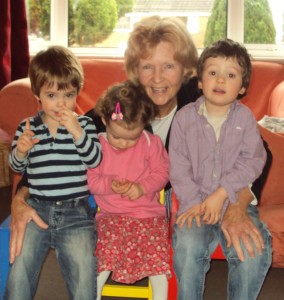Scripture is dotted with verses expressing the intensity of God’s love for people. And he has a special love relationship with those who follow him wholeheartedly and do their best to obey his commands.
Although I would never claim to understand the depth of his love for me, this week I’m getting a taste of intense love in the company of young Nicholas, Evelyn and Thomas, my 3 little British grands. The 4 of us recently spent a day with their other grandma, “Dandy”, playing together while their mummy took some much needed time for other things.
Our well-oiled grannie machine, Team Gran UK, operated at full power as we trucked the children here and there on a cold rainy day and whiled away the afternoon playing childish games in front of a parlor fire at Dandy’s house. While our little darlings played, we grandmas talked about the intensity of love we feel for our shared grands, different than mother-love and in a sense larger, because we’re allowed to be less taken with the here-and-now and more focused on the big picture.
God’s love is larger still, though. After all, he says it’s “as great as the height of the heavens.” (Psalm 103) His love is vast, larger than any of us can possibly experience, but maybe through grandchild-loving he does let us get a glimpse of it.
There is one other radical difference between God and us in terms of loving grandchildren: he doesn’t have any.
Each person who puts their trust in the Lord is reborn directly to him. He’s their Father, and Jesus is their brother. Christianity doesn’t filter through the generations by heredity, nor does it get passed along by family tradition. It doesn’t get watered down as oral history might, and it doesn’t become contaminated by over-use. Each conversion experience is brand-spankin’ new and pure, on its own.
I’m puzzled, however, by a couple of verses in the same Psalm that refer to spiritual grandchildren: “The love of the Lord remains forever with those who fear him. His salvation extends to the children’s children of those who are faithful to his covenant, of those who obey his commandments.” (vv. 17-18)
Children’s children? Aren’t those grandchildren? What does he mean?
Maybe he’s highlighting the precious privilege we grandparents have to model godliness for our grandchildren and to faithfully pray for them. Though our lives will eventually blow away like dust on a blustery day, our positive influence can continue through generations. In other words, nurturing our grands today can actually affect future relatives we’ll never meet.
And that puts a whole new light on Team Gran playing childish games with children in front of a warm fire on a cold winter day.
“He is the faithful God who keeps his covenant for a thousand generations and lavishes his unfailing love on those who love him and obey his commands.” (Deuteronomy 7:9)






